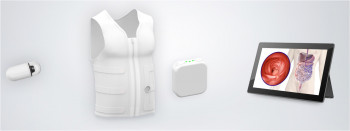News
Queen Mary pre-spinout CE-Track joins medtech venture builder cohort
Centre for Electronics14 July 2025
Queen Mary University of London's CE-Track, a pre-spinout co-founded by Professor Akram Alomainy, Mohamed Adhnan Thaha, and Muhammad Qamar Satti, has been selected for the London Institute for Healthcare Engineering (LIHE) MedTech Venture Builder programme for 2025-2026. Queen Mary University of London is a key partner in this programme.
The MedTech Venture Builder is a 12-month, two-stage programme designed to accelerate early-stage medical technologies into investment-ready healthcare ventures. It offers hands-on executive support for medical innovations and aims to give MedTech entrepreneurs the confidence to proceed at pace from bench to bedside to boardroom. The programme provides foundational training combined with tailored execution support, covering regulatory guidance, market validation, quality systems, and investor readiness.
CE-Track is focused on advancing real-time tracking for capsule endoscopy, combined with wearable technology, to enable precise diagnosis of gastrointestinal pathologies. This innovative and multidisciplinary venture integrates advanced sensing technologies, machine learning, and clinical insight to develop intelligent solutions for real-time patient monitoring and decision support.
Professor Akram Alomainy, Deputy Dean for PGR in the Faculty of Science and Engineering and Professor of Antennas and Applied Electromagnetics at Queen Mary University of London, expressed his excitement about this opportunity, highlighting its potential to accelerate their vision for smarter, connected healthcare technologies. He also acknowledged the continuous support from Queen Mary Innovation.
The 2025-2026 cohort of the MedTech Venture Builder comprises 15 early-stage ventures spanning 12 innovation areas, including Imaging & AI, Dental care, Surgery, Mental Health & Neurotechnology, Gastrointestinal, Women's health, Cancer, Brain Computer Interfaces (BCI), Prosthetics, Physiotherapy rehabilitation, BioSensors, and Wound care. According to the programme's venture type breakdown, 60% are pre-spinout/spinout, and 40% are independent startups. In terms of device type, 66.7% involve hardware and software, 20% are hardware, and 13.3% are Software as a Medical Device (SaaMD).
The programme commenced with a high-energy three-day bootcamp. Consortium Partners in the MVB include King's College London, Queen Mary University of London, City St George's, University of London, and Meridian Health Ventures.
Updated by: Ilyana Zolotareva





